Unless you’re a full-time RVer, you probably use your RV seasonally. Covering your RV and protecting your investment should be a priority when your camping season winds down. It may seem daunting and expensive, but it’s a good idea for many reasons.
In the long term, RV covers protect your RV from many issues that require expensive repairs. They also protect against unsightly things like bird droppings, minimizing how much you need to wash your RV when you’re ready to camp again.
But what really happens if you leave your recreational vehicle unprotected?
Why You Should Cover Your RV?
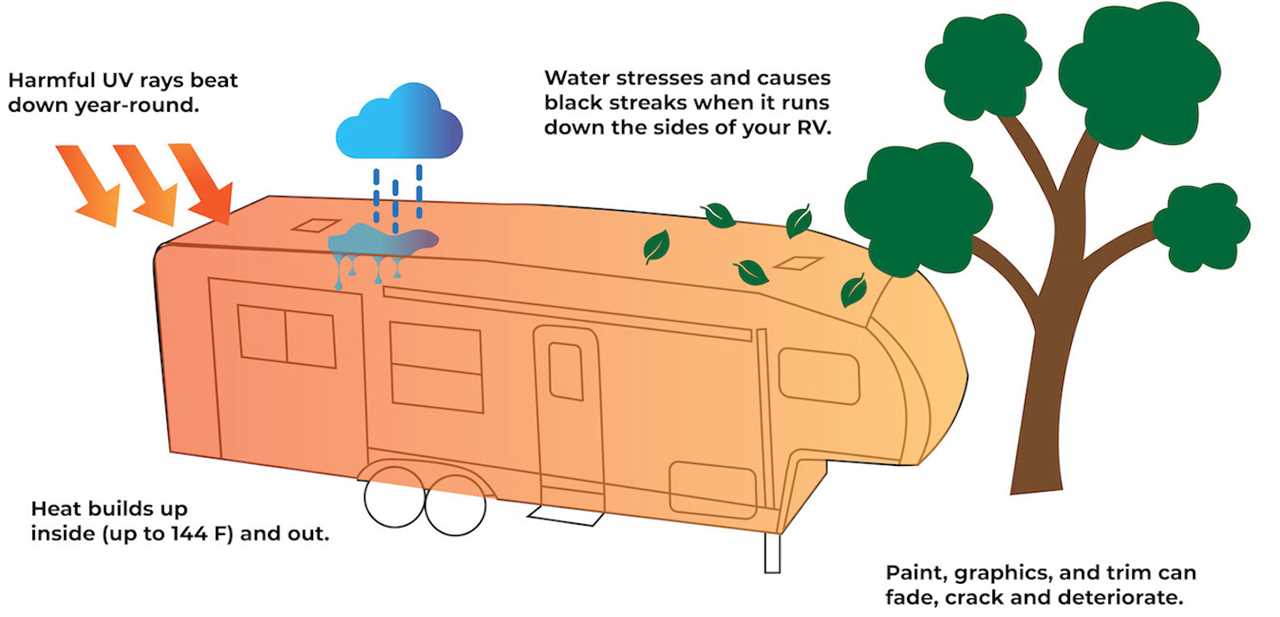
Photo by Camping World
Here’s why covering your RV when it’s not in use is so important:
- UV rays beat down on your RV, causing heat to build up on the surface, which can result in UV damage to paint, decals, seals, and other RV components.
- Your RV can reach interior temperatures of up to 144°F.
- If heavy snow builds up on your RV and melts as warmer weather approaches, water will be left on top of the roof. Pooling water stresses your RV’s structure and, if left unattended, can require a complete roof repair.
- Harmful weather like snow, sleet, and rain can leave an unprotected RV vulnerable to leaks.
- The RV’s paint, graphics, and trim will fade, crack, and deteriorate.
- Dirt and debris collect on your RV’s roof, leaving black streaks when rain rinses it off.
How Does a Cover Protect Your RV?
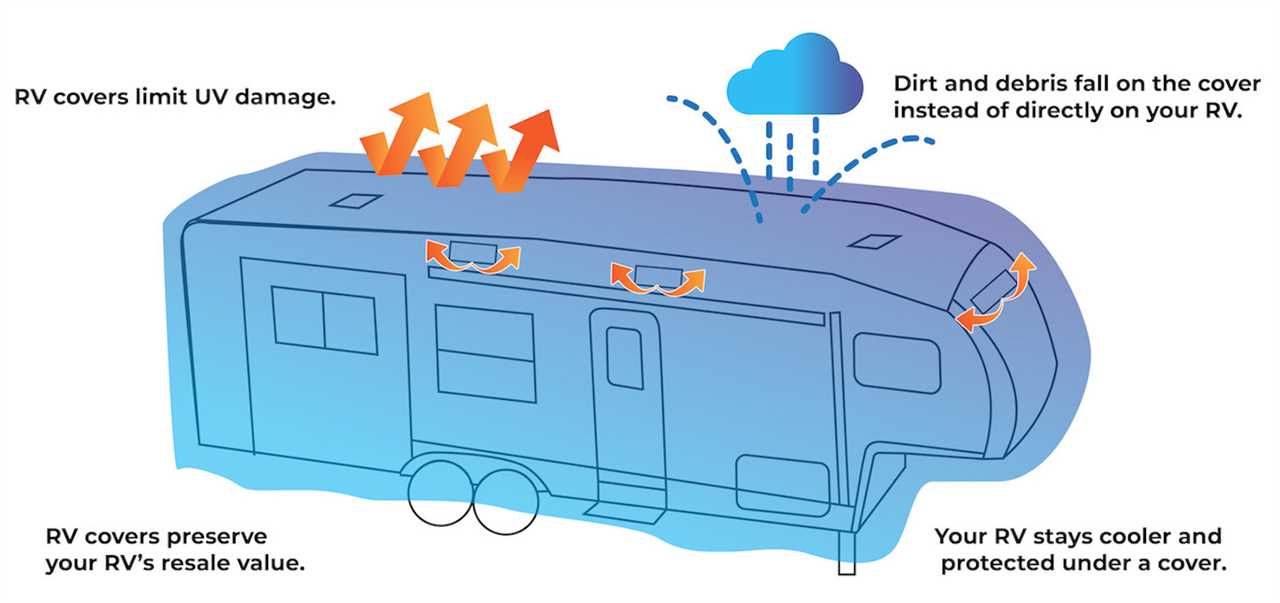
Photo by Camping World
And here’s how an RV or trailer cover can extend the life of your RV:
- Repels UV rays, minimizing the potential for UV damage.
- Keeps interior temperatures at or below 81° F. Deflected sunlight means lower interior and exterior temperatures.
- Protects your RV from rain, sleet, snow, and ice, which reduces the risk of leaks.
- Guards exterior paint, graphics, and trim to minimize fading and cracking.
- Reduces build-up of dirt and debris, leaving your RV without any black streaks.
- Reduces the need for RV washings, waxings, and roof treatments.
- Protects your investment and preserves your RV’s resale value.
How To Find the Right RV Cover
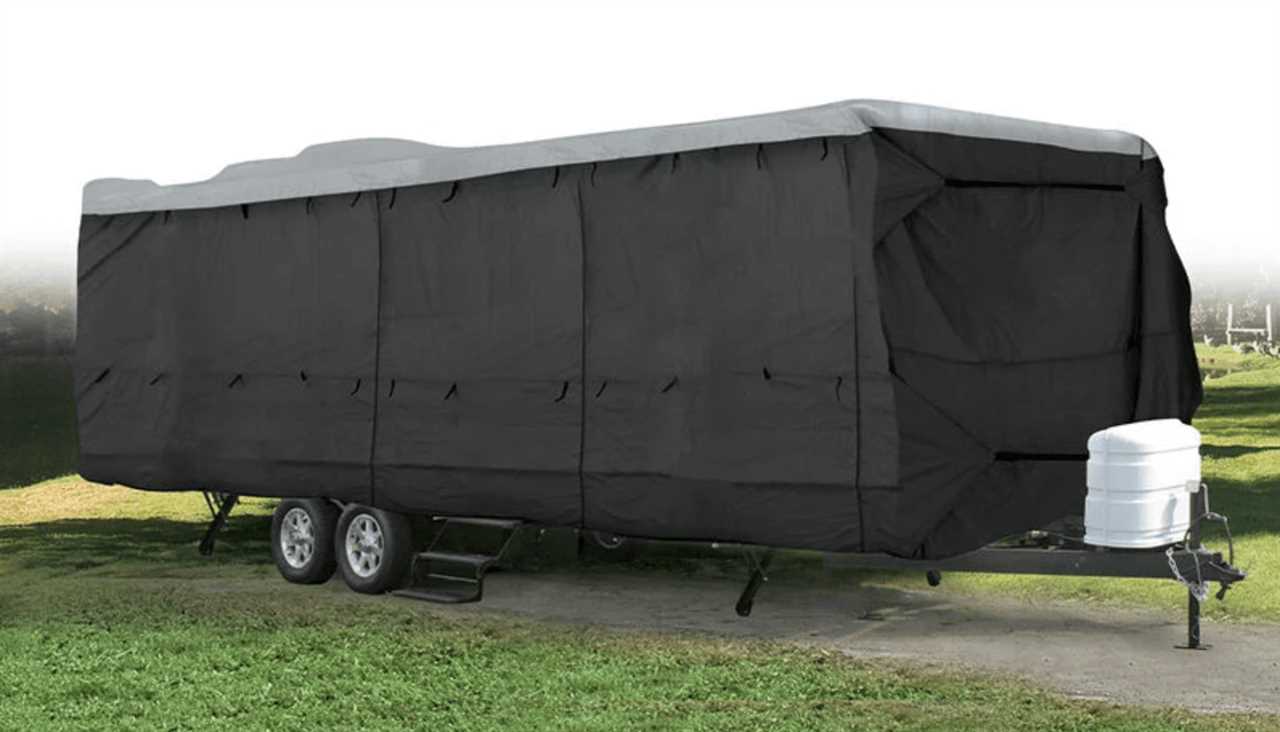
Photo by Camping World
RV covers are available in sizes for almost any RV. So your first consideration is narrowing down covers based on the kind of RV you need to protect. Here are a few resources to help you find the right cover for your RV type:
- Class A Covers
- Class B Covers
- Class C Covers
- Travel Trailer Covers
- Fifth Wheel Covers
- Toy Hauler Covers
- Pop-up Camper Covers
Aside from your RV types, here are a few additional buying considerations for RV owners:
RV Size
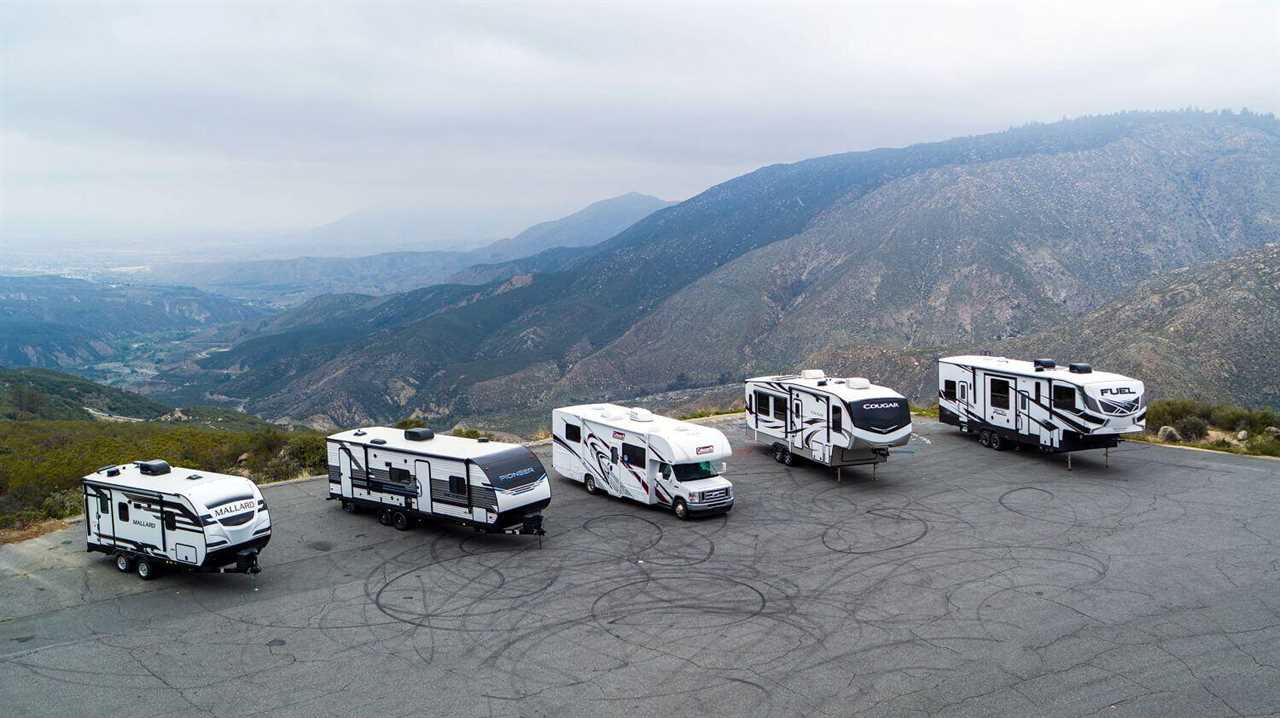
Photo by Camping World
Your RV’s length and height dictate the size you need to ensure your cover fits. Most covers will fit a small range of RV lengths, such as 20’1” to 22’. You’ll be fine if you select a cover that matches your RV type and fits its dimensions.
That said, there’s nothing wrong with selecting the next size up if your RV is pushing the upper limit of a size range (i.e. opting for the 22’1” to 24’ cover if your motorhome is exactly 22’ long). You just don’t want to go too large, as that’ll result in excess material that increases the risk of rips or tears in high winds.
You can also order a custom cover if your RV is less common or has special features that aren’t standard on most recreational vehicles. To do this, you’ll need to contact an RV cover manufacturer directly.
Material
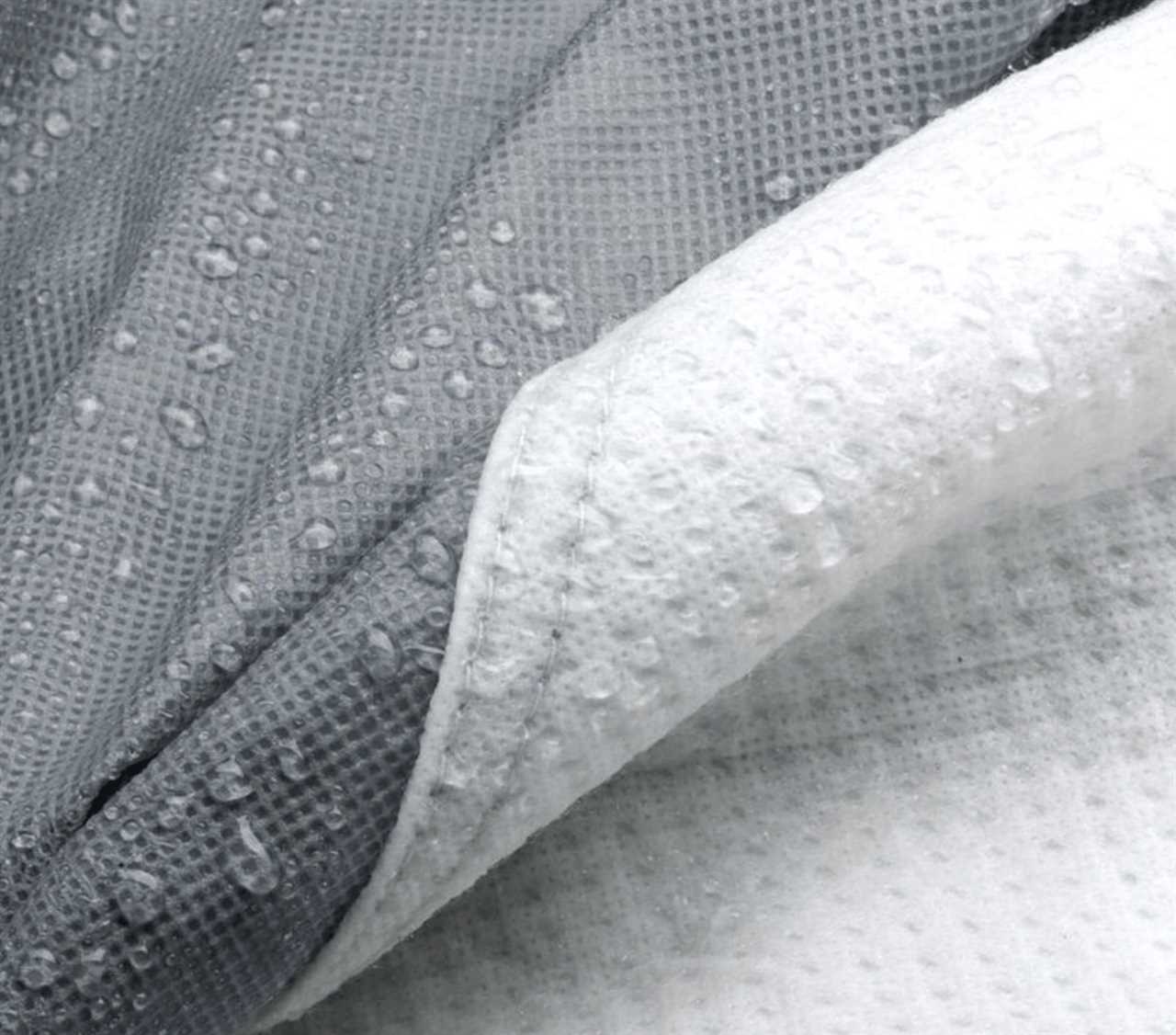
Photo by Camping World
The right cover material for your RV depends on where it’ll be stored. If you’re in a colder climate, you’ll need a more heavy-duty material to hold up against snow and ice. But if you’re in a humid climate, you’ll prioritize RV covers made with breathable materials that don’t trap moisture.
Polypropylene, ripstop, and high-density olefin are three common materials used in RV covers. But there’s a lot of variation in the thickness of these fabrics and how they’ve been treated to provide extra weather resistance or ventilation. So you’ll need to compare individual covers to find the right balance between durability and breathability for your environment.
Accessibility
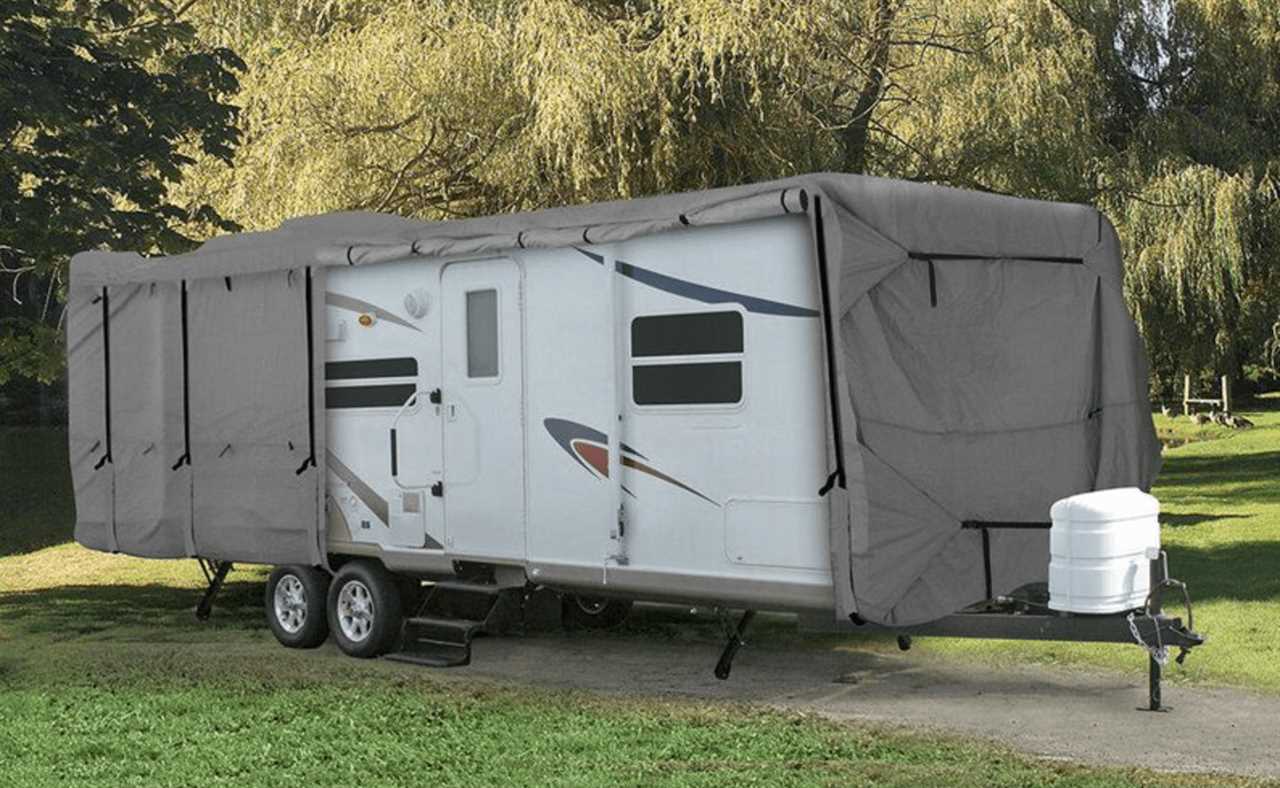
Photo by Camping World
The final point to consider is how easy it will be to get into your RV once your cover is installed. Although the point of an RV cover is to protect your motorhome when you’re not using it, occasionally you might want to go in to check on your RV or grab something you forgot to unload.
That’s why it’s nice to have a cover with multiple panels that can be unzipped for easy access. So whether you need to go in the main door or just check on an underneath compartment, you can unzip the applicable panel to gain access instead of removing the entire cover.
FAQs About RV Covers
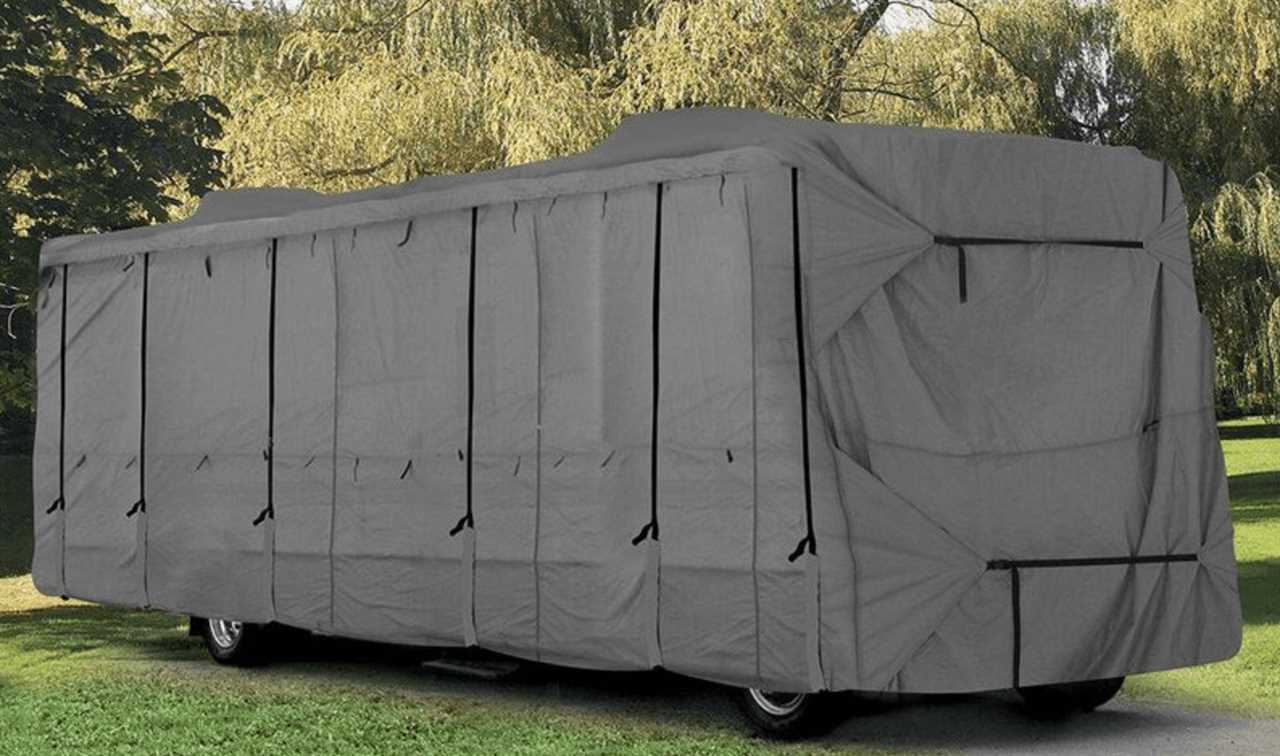
Photo by Camping World
Here are a few other important points you should know about RV covers:
Can RV covers cause mold?
Ventilation is important when you cover your RV. That’s why good RV covers have vents that allow airflow to reduce condensation. Their breathable fabrics are designed to prevent mold, but it’s still a good idea to check your cover at least once a month so you can find and deal with mold if it does occur.
Can RV covers withstand high winds?
RV covers are built with straps that allow you to tighten them to your camper. This reduces the amount of loose material that can be caught in the wind. The main danger to your RV cover’s health is improper usage.
If you fail to tighten your cover, high winds can indeed cause tears. If the forecast in your area calls for high winds, head out to re-tighten the straps on your RV cover, especially if it’s been a few weeks since you put it on.
Are RV covers only for the roof?
Not at all! RV covers protect the top and sides of your camper, as well as your tires. While you can also install tire covers to keep your RV tires in good condition while in storage, RV covers will protect your roof, tires, and all four sides of your camper from sunlight, moisture, and other airborne debris.
From pop-ups to travel trailers to Class A motorhomes, RV covers will keep your RV in good condition when you’re not using it. So when the camping season rolls around again, you can simply remove the cover, and you’re ready to hit the road again.
Shop Camping World’s complete collection of RV covers.
Camping World can help also help if you’re looking to sell or trade-in your current RV.
What other questions do you have about why RV covers are important? Let us know in the comments below.
By: Tucker Ballister
Title: Why Should You Cover Your RV?
Sourced From: blog.campingworld.com/rv-basics/why-should-you-cover-your-rv/
Published Date: Thu, 04 Aug 2022 14:00:48 +0000
---------------------------------------------
 CampingSurvivalistHuntingFishingExploringHikingPrivacy PolicyTerms And Conditions
CampingSurvivalistHuntingFishingExploringHikingPrivacy PolicyTerms And Conditions
